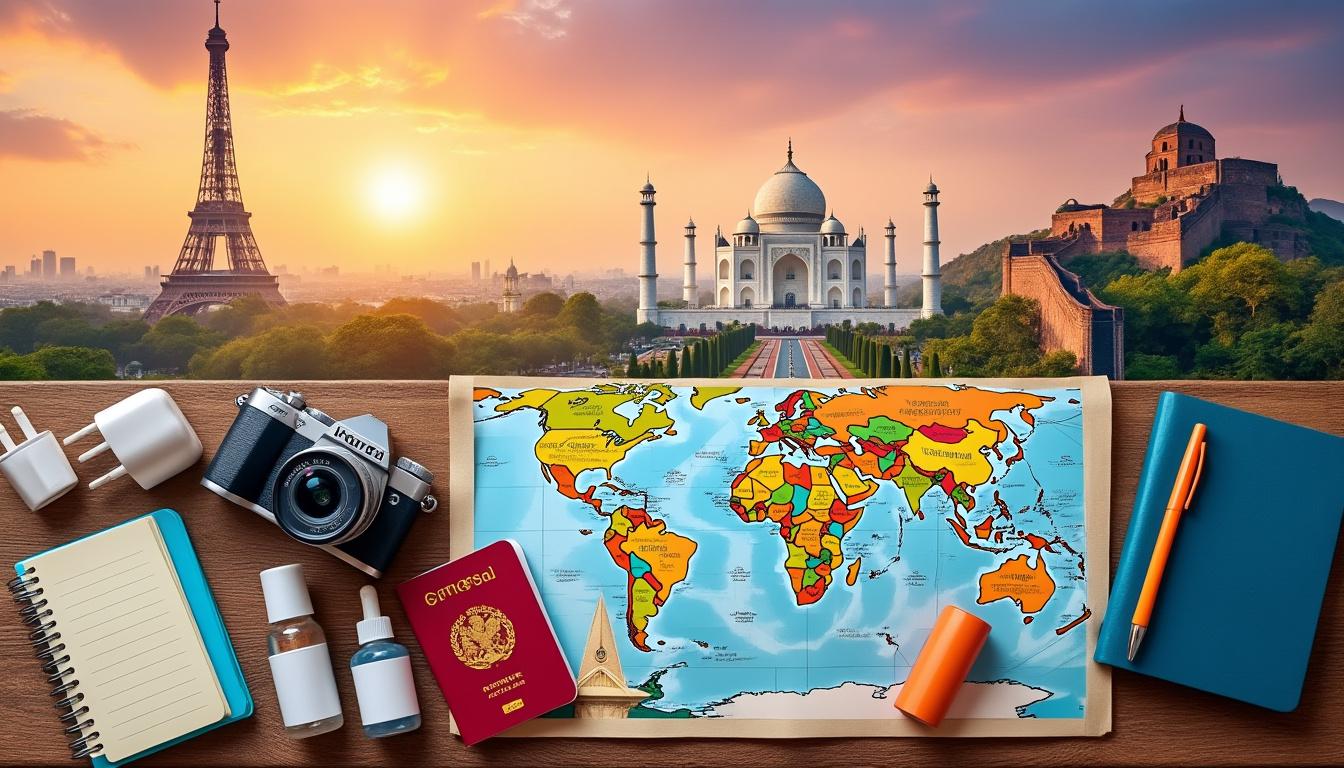International travel presents an exciting gateway to diverse cultures and unforgettable experiences, yet it often demands meticulous preparation to navigate unfamiliar environments smoothly. From securing travel documents to understanding local customs and managing logistics like visas, currency exchange, and communication, each step requires careful attention. Embracing these elements not only reduces stress but transforms international journeys into enriching adventures enhanced by the right knowledge and tools. This guide compiles essential strategies to ensure your international travel in 2025 is seamless, enjoyable, and full of discovery.
Essential Passport and Visa Tips for International Travel Success
Securing valid travel documents remains the cornerstone of any international trip. Travelers must allow ample time for acquiring or renewing passports—processing typically requires four to six weeks, and delays can jeopardize travel plans. For those venturing to countries that mandate visas or Electronic Travel Authorizations (ETAs), researching specific requirements well ahead of departure is vital.
- Apply early for passport or renewal: Initiate applications before booking flights to avoid last-minute stress.
- Check visa and ETA regulations: Confirm entry criteria for your destination via reliable sources such as the State Department or National Geographic travel advisories.
- Keep digital and physical copies: Store passport and visa information securely during the trip for easy access.
| Document | Required Lead Time | Typical Processing Time | Notes |
|---|---|---|---|
| Passport Application | Before booking flights | 4-6 weeks standard; expedited available | Early application recommended to avoid extra fees |
| Visa or ETA | Several weeks to months | Varies by country | Research specific rules on official government sites |
Managing Airport Transits Without Hassle
International airport procedures require travelers to anticipate additional time for immigration, customs, and security checks. Layovers demand extra padding since connecting flights abroad often entail collecting checked baggage, clearing customs, then rechecking luggage before onward travel.
- Schedule generous layover times: Avoid tight connections especially at unfamiliar international hubs.
- Stay alert post-landing: Flight attendants often provide crucial instructions for reclaiming luggage or proceeding through customs.
- Opt for carry-ons when possible: Traveling light with just a carry-on simplifies transfers and reduces waiting.
| Airport Procedure | Estimated Time | Traveler Tips |
|---|---|---|
| Immigration and customs | 30-90 minutes depending on airport | Prepare passport and paperwork ahead |
| Luggage claim and recheck | 20-40 minutes | Follow crew instructions and signage carefully |
| Security screening | 15-45 minutes | Pack liquids and electronics accessibly |
Power and Connectivity: Stay Charged and Online Globally
Adapters and voltage compatibility can make or break the convenience of electronics on international trips. Since plugs vary widely outside North America, carrying a universal adapter ensures your devices stay connected. Moreover, voltage differences—commonly double that of the U.S. in many regions—necessitate voltage converters for high-powered appliances.
- Universal adapter: Supports multiple plug types; indispensable for charging phones, laptops, and cameras.
- Voltage converter: Essential for appliances like hairdryers or curling irons not rated for international voltage.
- Use eSIM technology: Secure cost-effective mobile data plans abroad via carriers or apps like Airalo.
| Region | Standard Voltage | Common Plug Type | Notes |
|---|---|---|---|
| Europe, Asia, Australia | 220-240V | Type C, F, G | Voltage nearly double U.S., requires converter for some devices |
| North America (U.S., Canada) | 110-120V | Type A, B | Compatible with most American electronics |
| South America | Varies, ~220V | Type C, N | Check each country’s specifics |
Understanding your device compatibility and carrying the right equipment can save precious time and frustration abroad. Additionally, leveraging eSIMs, as highlighted by tech-savvy travelers on platforms like TripAdvisor and Lonely Planet, offers transparency and budget-friendly connectivity.
Smart Money Management Strategies for International Journeys
Financial planning ahead of travel is crucial to avoid pitfalls like poor currency exchange rates and surprise fees. Airports often offer unfavorable conversions, so alternative options are more cost-effective.
- Local currency: Arrange some cash before departure through banks or trusted online services.
- ATM withdrawals: Often better rates than airport exchanges; beware of bank fees and use network-affiliated machines.
- Credit cards with no foreign transaction fees: Cards like Chase Sapphire Preferred reduce extra costs on international purchases.
- PIN setup: Essential for European and Canadian credit card terminals requiring PIN verification.
| Payment Method | Advantages | Considerations |
|---|---|---|
| Airport currency exchange | Immediate cash on arrival | Usually poorest exchange rates and high fees |
| Bank currency orders | Better rates, pre-trip preparation | Requires planning time |
| Credit cards | Convenient, often rewards points | May require PIN, potential foreign fees unless card waived them |
| ATM withdrawals | Good exchange rates, accessible locally | Possible withdrawal fees |
Travel Insurance and Health Precautions Are Investment in Peace of Mind
No international vacation is complete without preparation for unforeseen circumstances, including health emergencies, cancellations, or lost belongings.
- Purchase travel insurance: Covers trip interruption, medical emergencies, and baggage loss; offered by providers and some credit cards.
- Check vaccination requirements: Consult health advice resources and sites such as the Centers for Disease Control or traveltoadventures.com/health-strategies-summer-travel before departure.
- Prepare essential medications: Carry in original packaging with prescriptions to avoid customs issues.
| Risk | Insurance Coverage | Preparation Tips |
|---|---|---|
| Trip cancellation/delay | Reimbursement for prepaid costs | Buy policy promptly after booking |
| Medical emergency | Hospital and treatment expenses | Understand coverage limits and exclusions |
| Lost luggage | Compensation for essentials | Keep valuables in carry-on |
Additional Tips for a Seamless International Travel Experience
- Use trusted travel platforms: Kayak, Expedia, Travelocity, and Booking.com offer reliable services for booking flights and accommodations.
- Plan accommodations thoughtfully: Airbnb and Rick Steves provide unique lodging options aligned with local culture.
- Research destination guides: Resources like Lonely Planet and National Geographic enhance understanding of local customs and attractions.
- Pack light but smart: This reduces transit hassle and adapts to varied climates effectively.
- Stay informed: Follow official travel advisories and community travel tips such as those found on traveltoadventures.com/state-department-summer-travel.
| Tip Category | Recommended Resources | Key Benefit |
|---|---|---|
| Flight and hotel booking | Kayak, Expedia, Travelocity, Booking.com | Best prices and flexible options |
| Accommodation planning | Airbnb, Rick Steves | Authentic, local experience |
| Travel planning and knowledge | Lonely Planet, National Geographic | In-depth cultural insight, safety guidance |
| Travel safety | Government and travel blogs | Up-to-date alerts and practical advice |
Frequently Asked Questions About International Travel
- Q: How early should I apply for a passport before international travel?
A: Ideally, apply at least 6-8 weeks before your trip to account for standard processing and mailing times, avoiding expedited fees. - Q: What are the safest ways to manage money abroad?
A: Using credit cards without foreign transaction fees, carrying some local currency pre-trip, and withdrawing cash from trusted ATMs balance convenience and cost-efficiency. - Q: How can I avoid high airport currency exchange fees?
A: Order foreign currency from your bank before travel or withdraw at destination ATMs to get better rates and reduce fees. - Q: Is travel insurance necessary for all international trips?
A: While optional, it’s highly recommended to protect against unforeseen cancellations, medical costs, or lost baggage, especially for costly or long-duration trips. - Q: How do I know if my electronics need a voltage converter abroad?
A: Check the voltage rating on your device; anything not compatible with 220-240V requires a converter to avoid damage or hazards.


